- Home
- Veronica Roth
Four_The Traitor Page 4
Four_The Traitor Read online
Page 4
I don’t have the right word for how she looks, but even now, with parts of her face swollen and discolored, there’s something striking about her, something I haven’t seen before.
In that moment I’m able to accept the inevitability of how I feel, though not with joy. I need to talk to someone. I need to trust someone. And for whatever reason, I know, I know it’s her.
I’ll have to start by telling her my name.
I approach Eric in the breakfast line, standing behind him with my tray as he uses a long-handled spoon to scoop scrambled eggs onto his plate.
“If I told you that one of the initiates was attacked last night by a few of the other initiates,” I say, “would you even care?”
He pushes the eggs to one side of his plate, and lifts a shoulder. “I might care that their instructor doesn’t seem to be able to control his initiates,” Eric says as I pick up a bowl of cereal for myself. He eyes my split knuckles. “I might care that this hypothetical attack would be the second under that instructor’s watch . . . whereas the Dauntless-borns don’t seem to have this problem.”
“Tensions between the transfers are naturally higher—they don’t know each other, or this faction, and their backgrounds are wildly different,” I say. “And you’re their leader, shouldn’t you be responsible for keeping them ‘under control’?”
He sets a piece of toast next to his eggs with some tongs. Then he leans in close to my ear and says, “You’re on thin ice, Tobias,” he hisses. “Arguing with me in front of the others. ‘Lost’ simulation results. Your obvious bias toward the weaker initiates in the rankings. Even Max agrees now. If there was an attack, I don’t think he would be too happy with you, and he might not object when I suggest that you be removed from your post.”
“Then you’d be out an initiation instructor a week before the end of initiation.”
“I can finish it out myself.”
“I can only imagine what it would be like under your watch,” I say, narrowing my eyes. “We wouldn’t even need to make any cuts. They would all die or defect on their own.”
“If you’re not careful you won’t have to imagine anything.” He reaches the end of the food line and turns to me. “Competitive environments create tension, Four. It’s natural for that tension to be released somehow.” He smiles a little, stretching the skin between his piercings. “An attack would certainly show us, in a real-world situation, who the strong ones and the weak ones are, don’t you think? We wouldn’t have to rely on the test results at all, that way. We could make a more informed decision about who doesn’t belong here. That is . . . if an attack were to happen.”
The implication is clear: As the survivor of the attack, Tris would be viewed as weaker than the other initiates, and fodder for elimination. Eric wouldn’t rush to the aid of the victim, but would rather advocate for her expulsion from Dauntless, as he did before Edward left of his own accord. I don’t want Tris to be forced into factionlessness.
“Right,” I say lightly. “Well, it’s a good thing no attacks have happened recently, then.”
I dump some milk on top of my cereal and walk to my table. Eric won’t do anything to Peter, Drew, or Al, and I can’t do anything without stepping out of line and suffering the repercussions. But maybe—maybe I don’t have to do this alone. I put my tray down between Zeke and Shauna and say, “I need your help with something.”
After the fear landscape explanation is over and the initiates are dismissed for lunch, I pull Peter aside into the observation room next to the bare simulation room. It contains rows of chairs, ready for the initiates to sit in as they wait to take their final test. It also contains Zeke and Shauna.
“We need to have a chat,” I say.
Zeke lurches toward Peter, slamming him against the concrete wall with alarming force. Peter cracks the back of his head, and winces.
“Hey there,” Zeke says, and Shauna moves toward them, spinning a knife on her palm.
“What is this?” Peter says. He doesn’t even look a little afraid, even when Shauna catches the blade by the handle and touches the point to his cheek, creating a dimple. “Trying to scare me?” he sneers.
“No,” I say. “Trying to make a point. You’re not the only one with friends who are willing to do some harm.”
“I don’t think initiation instructors are supposed to threaten initiates, do you?” Peter gives me a wide-eyed look, one I might mistake for innocence if I didn’t know what he was really like. “I’ll have to ask Eric, though, just to be sure.”
“I didn’t threaten you,” I say. “I’m not even touching you. And according to the footage of this room that’s stored on the control room computers, we’re not even in here right now.”
Zeke grins like he can’t help it. That was his idea.
“I’m the one who’s threatening you,” Shauna says, almost in a growl. “One more violent outburst and I’m going to teach you a lesson about justice.” She holds the knife point over his eye, and brings it down slowly, pressing the point to his eyelid. Peter freezes, barely moving even to breathe. “An eye for an eye. A bruise for a bruise.”
“Eric may not care if you go after your peers,” Zeke says, “but we do, and there are a lot of Dauntless like us. People who don’t think you should lay a hand on your fellow faction members. People who listen to gossip, and spread it like wildfire. It won’t take long for us to tell them what kind of worm you are, or for them to make your life very, very difficult. You see, in Dauntless, reputations tend to stick.”
“We’ll start with all your potential employers,” Shauna says. “The supervisors in the control room—Zeke can take them; the leaders out by the fence—I’ll get those. Tori knows everyone in the Pit—Four, you’re friends with Tori, right?”
“Yes I am,” I say. I move closer to Peter, and tilt my head. “You may be able to cause pain, initiate . . . but we can cause you lifelong misery.”
Shauna takes the knife away from Peter’s eye. “Think about it.”
Zeke lets go of Peter’s shirt and smooths it down, still smiling. Somehow the combination of Shauna’s ferocity and Zeke’s cheerfulness is just strange enough to be threatening. Zeke waves at Peter, and we all leave together.
“You want us to talk to people anyway, right?” Zeke asks me.
“Oh yeah,” I say. “Definitely. Not just about Peter. Drew and Al, too.”
“Maybe if he survives initiation, I’ll accidentally trip him and he’ll fall right into the chasm,” Zeke says hopefully, making a plummeting gesture with his hand.
The next morning, there’s a crowd gathered by the chasm, all quiet and still, though the smell of breakfast beckons us all toward the cafeteria. I don’t have to ask what they’re gathered for.
This happens almost every year, I’m told. A death. Like Amar’s, sudden and awful and wasteful. A body pulled out of the chasm like a fish on a hook. Usually someone young—an accident, because of a daredevil stunt gone wrong, or maybe not an accident, a wounded mind further injured by the darkness, pressure, pain of Dauntless.
I don’t know how to feel about those deaths. Guilty, maybe, for not seeing the pain myself. Sad, that some people can’t find another way to escape.
I hear the name of the deceased spoken up ahead, and both emotions strike me hard.
Al. Al. Al.
My initiate—my responsibility, and I failed, because I’ve been so obsessed with catching Max and Jeanine, or with blaming everything on Eric, or with my indecision about warning the Abnegation. No—none of those things so much as this: that I distanced myself from them for my own protection, when I should have been drawing them out of the dark places here and into the lighter ones. Laughing with friends on the chasm rocks. Late-night tattoos after a game of Dare. A sea of embraces after the rankings are announced. Those are the things I could have shown him—even if it wouldn’t have helped him, I should have tried.
I know one thing: after this year’s initiation is done, Eric won’t need to try so
hard to oust me from this position. I’m already gone.
Al. Al. Al.
Why do all dead people become heroes in Dauntless? Why do we need them to? Maybe they’re the only ones we can find in a faction of corrupt leaders, competitive peers, and cynical instructors. Dead people can be our heroes because they can’t disappoint us later; they only improve over time, as we forget more and more about them.
Al was unsure and sensitive, and then jealous and violent, and then gone. Softer men than Al have lived and harder men than Al have died and there’s no explanation for any of it.
But Tris wants one, craves one, I can see it in her face, a kind of hunger. Or anger. Or both. I can’t imagine it’s easy to like someone, hate them, and then lose them before any of those feelings are resolved. I follow her away from the chanting Dauntless because I’m arrogant enough to believe I can make her feel better.
Right. Sure. Or maybe I follow her because I’m tired of being so removed from everyone, and I’m no longer sure it’s the best way to be.
“Tris,” I say.
“What are you doing here?” she says bitterly. “Shouldn’t you be paying your respects?”
“Shouldn’t you?” I move toward her.
“Can’t pay respect when you don’t have any.” I’m surprised, for a moment, that she can manage to be so cold—Tris isn’t always nice, but she’s rarely cavalier about anything. It only takes her a second to shake her head. “I didn’t mean that.”
“Ah.”
“This is ridiculous,” she says, flushing. “He throws himself off a ledge and Eric’s calling it brave? Eric, who tried to have you throw knives at Al’s head?” Her face contorts. “He wasn’t brave! He was depressed and a coward and he almost killed me! Is that the kind of thing we respect here?”
“What do you want them to do?” I say as gently as I can—which isn’t saying much. “Condemn him? Al’s already dead. He can’t hear it, and it’s too late.”
“It’s not about Al,” she says. “It’s about everyone watching! Everyone who now sees hurling themselves into the chasm as a viable option. I mean, why not do it if everyone calls you a hero afterward? Why not do it if everyone will remember your name?” But of course, it is about Al, and she knows that. “It’s . . .” She’s struggling, fighting with herself. “I can’t . . . This would never have happened in Abnegation! None of it! Never. This place warped him and ruined him, and I don’t care if saying that makes me a Stiff, I don’t care, I don’t care!”
My paranoia is so deeply ingrained, I look automatically at the camera buried in the wall above the drinking fountain, disguised by the blue lamp fixed there. The people in the control room can see us, and if we’re unlucky, they could choose this moment to hear us, too. I can see it now, Eric calling Tris a faction traitor, Tris’s body on the pavement near the railroad tracks . . .
“Careful, Tris,” I say.
“Is that all you can say?” She frowns at me. “That I should be careful? That’s it?”
I understand that my response wasn’t exactly what she was expecting, but for someone who just railed against Dauntless recklessness, she’s definitely acting like one of them.
“You’re as bad as the Candor, you know that?” I say. The Candor are always running their mouths, never thinking about the consequences. I pull her away from the drinking fountain, and then I’m close to her face and I can see her dead eyes floating in the water of the underground river and I can’t stand it, not when she was just attacked and who knows what would have happened if I hadn’t heard her scream.
“I’m not going to say this again, so listen carefully.” I put my hands on her shoulders. “They are watching you. You, in particular.”
I remember Eric’s eyes on her after the knife throwing. His questions about her deleted simulation data. I claimed water damage. He thought it was interesting that the water damage occurred not five minutes after Tris’s simulation ended. Interesting.
“Let go of me,” she says.
I do, immediately. I don’t like hearing her voice that way.
“Are they watching you, too?”
Always have been, always will be. “I keep trying to help you, but you refuse to be helped.”
“Oh, right. Your help,” she says. “Stabbing my ear with a knife and taunting me and yelling at me more than you yell at anyone else, it sure is helpful.”
“Taunting you? You mean when I threw the knives? I wasn’t taunting you!” I shake my head. “I was reminding you that if you failed, someone else would have to take your place.”
To me, at the time, it almost seemed obvious. I thought, since she seemed to understand me better than most people, she might understand that, too. But of course she didn’t. She’s not a mind reader.
“Why?” she says.
“Because . . . you’re from Abnegation,” I say. “And . . . it’s when you’re acting selflessly that you are at your bravest. And if I were you, I would do a better job of pretending that selfless impulse is going away, because if the wrong people discover it . . . well, it won’t be good for you.”
“Why? Why do they care about my intentions?”
“Intentions are the only thing they care about. They try to make you think they care about what you do, but they don’t. They don’t want you to act a certain way, they want you to think a certain way. So you’re easy to understand. So you won’t pose a threat to them.”
I put my hand on the wall near her face and lean into it, thinking of the tattoos forming a line on my back. It wasn’t getting the tattoos that made me a faction traitor. It was what they meant to me—an escape from the narrow thinking of any one faction, the thinking that slices away at all the different parts of me, paring me down to just one version of myself.
“I don’t understand why they care what I think, as long as I’m acting how they want me to,” she says.
“You’re acting how they want you to now, but what happens when your Abnegation-wired brain tells you to do something else, something they don’t want?”
Much as I like him, Zeke is the perfect example. Dauntless-born, Dauntless-raised, Dauntless-chosen. I can count on him to approach everything the same way. He was trained to from birth. To him, there are no other options.
“I might not need you to help me. Ever think about that?” she says. I want to laugh at the question. Of course she doesn’t need me. When was it ever about that? “I’m not weak, you know. I can do this on my own.”
“You think my first instinct is to protect you.” I shift so I’m a little closer to her. “Because you’re small, or a girl, or a Stiff. But you’re wrong.”
Even closer. I touch her chin, and for a moment I think about closing this gap completely.
“My first instinct is to push you until you break, just to see how hard I have to press,” I say, and it’s a strange admission, and a dangerous one. I don’t mean her any harm, and never have, and I hope she knows that’s not what I mean. “But I resist it.”
“Why is that your first instinct?” she says.
“Fear doesn’t shut you down,” I say. “It wakes you up. I’ve seen it. It’s fascinating.” Her eyes in every fear simulation, ice and steel and blue flame. The short, slight girl with the wire-taut arms. A walking contradiction. My hand slips over her jaw, touches her neck. “Sometimes I just want to see it again. Want to see you awake.”
Her hands touch my waist, and she pulls herself against me, or pulls me against her, I can’t tell which. Her hands move over my back, and I want her, in a way I haven’t felt before, not just some kind of mindless physical drive but a real, specific desire. Not for “someone,” just for her.
I touch her back, her hair. It’s enough, for now.
“Should I be crying?” she asks, and it takes me a second to realize she’s talking about Al again. Good, because if this embrace made her want to cry, I would have to admit to knowing absolutely nothing about romance. Which might be true anyway. “Is there something wrong with me?”
> “You think I know anything about tears?” Mine come without prompting and disappear a few seconds later.
“If I had forgiven him . . . do you think he would be alive now?”
“I don’t know.” I set my hand on her cheek, my fingers stretching back to her ear. She really is small. I don’t mind it.
“I feel like it’s my fault,” she says.
So do I.
“It isn’t your fault.” I bring my forehead to hers. Her breaths are warm against my face. I was right, this is better than keeping my distance, this is much better.
“But I should have. I should have forgiven him.”
“Maybe. Maybe there’s more we all could have done,” I say, and then I spit out an Abnegation platitude without thinking. “But we just have to let the guilt remind us to do better next time.”
She pulls away immediately, and I feel that familiar impulse, to be mean to her so she forgets what I said, so she doesn’t ask me any questions.
“What faction did you come from, Four?”
I think you know. “It doesn’t matter. This is where I am now. Something you would do well to remember for yourself.”
I don’t want to be close to her anymore; it’s all I want to do.
I want to kiss her; now is not the time.
I touch my lips to her forehead, and neither of us moves. No turning back now, not for me.
Something she said sticks with me all day. This would never have happened in Abnegation.
At first I find myself thinking, She just doesn’t know what they’re really like.
But I’m wrong, and she’s right. Al would not have died in Abnegation, and he would not have attacked her there, either. They may not be as purely good as I once believed—or wanted to believe—but they certainly aren’t evil, either.
I see the map of the Abnegation sector, the one I found on Max’s computer, printed on my eyelids when I close my eyes. If I warn them, if I don’t, I’m a traitor either way, to one thing or another. So if loyalty is impossible, what do I strive for instead?

 Divergent
Divergent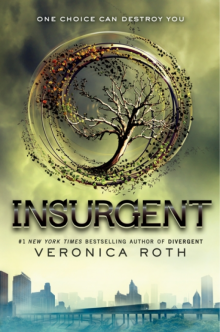 Insurgent
Insurgent Allegiant
Allegiant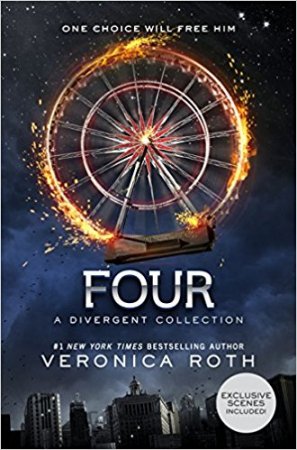 Four: A Divergent Collection
Four: A Divergent Collection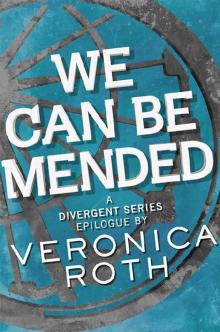 We Can Be Mended
We Can Be Mended The Son
The Son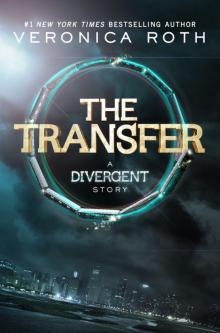 The Transfer
The Transfer The Traitor
The Traitor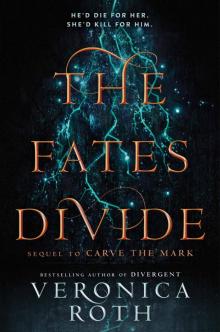 The Fates Divide
The Fates Divide Chosen Ones
Chosen Ones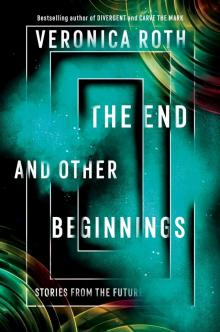 The End and Other Beginnings
The End and Other Beginnings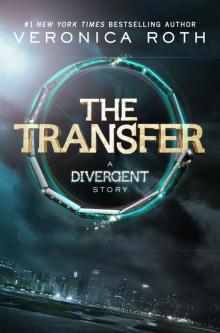 The Transfer: A Divergent Story
The Transfer: A Divergent Story Four_The Son
Four_The Son Divergent dt-1
Divergent dt-1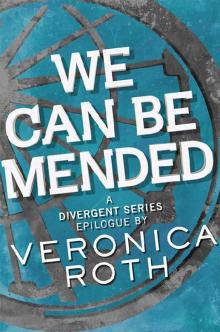 We Can Be Mended_A Divergent Story
We Can Be Mended_A Divergent Story![Ark [Forward Collection] Read online](http://i1.bookreadfree.com/i1/03/31/ark_forward_collection_preview.jpg) Ark [Forward Collection]
Ark [Forward Collection] Four_The Traitor
Four_The Traitor 10.22.13_The World of Divergent_The Path to Allegiant
10.22.13_The World of Divergent_The Path to Allegiant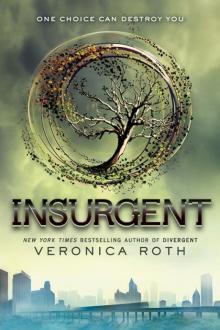 Insurgent (Divergent)
Insurgent (Divergent) The Divergent Series Complete Collection
The Divergent Series Complete Collection Divergent Collector's Edition
Divergent Collector's Edition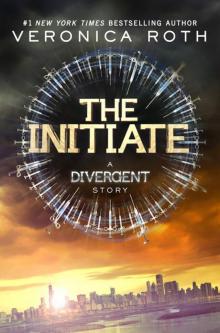 Four_The Initiate
Four_The Initiate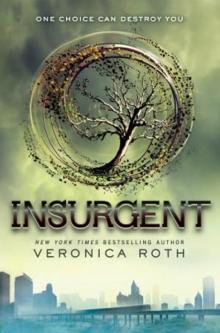 Insurgent d-2
Insurgent d-2